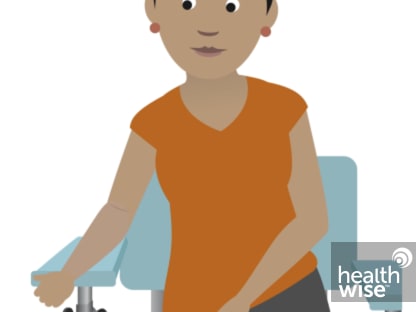Cholesterol and Triglycerides Tests
Test Overview
Cholesterol and triglyceride tests are blood tests that measure lipids—fats and fatty substances used as a source of energy by your body. Lipids are found in your blood and are stored in tissues. They are an important part of cells, and they help keep your body working normally. Lipids include cholesterol, Opens dialog, triglycerides, Opens dialog, high-density lipoprotein (HDL), Opens dialog, and low-density lipoprotein (LDL), Opens dialog.
Cholesterol and triglyceride tests measure:
- Total cholesterol level.
- Triglyceride level.
- HDL cholesterol level. This is the "good" cholesterol.
- LDL cholesterol level. This is the "bad" cholesterol.
Other measurements that may be done include:
- Apolipoprotein B (apoB) level.
- Lipoprotein (a) or Lp(a) level.
- Very-low-density lipoprotein (VLDL) cholesterol level.
- The ratio of total cholesterol to HDL.
- The ratio of LDL to HDL.
Your doctor may order these tests as part of a regular health exam. Your doctor may use the results to prevent, check on, or diagnose a medical condition. The results help your doctor check your risk of heart attack and stroke.
Follow your doctor's instructions on how to prepare for these tests. Your doctor may ask you to not eat or drink anything except water for 9 to 14 hours before your blood test. In most cases, you are allowed to take your medicines with water the morning of the test. Fasting is not always needed, but it may be recommended. Do not drink alcohol for 24 hours before the test.
Related Videos
Cholesterol and triglyceride testing is done:
- As part of a routine physical exam to screen for high cholesterol and high triglycerides.
- To check your response to medicine.
- To help find your risk of having heart and blood flow problems, including heart attack and stroke.
- If you have unusual symptoms, such as yellow fatty deposits in the skin (xanthomas). These symptoms may be caused by a genetic disease that causes very high cholesterol levels.
Cholesterol tests and heart attack risk
Your cholesterol levels can help your doctor find out your risk for having a heart attack or stroke.
But it's not just about your cholesterol. Your doctor uses your cholesterol levels plus other things to calculate your risk. These include:
- Your blood pressure.
- Whether or not you have diabetes.
- Your age, sex, and race.
- Whether or not you smoke.
Learn more
- Your doctor may ask you to not eat or drink anything except water for 9 to 14 hours before the tests. In most cases, you can take your medicines with water the morning of the test.
- Do not drink alcohol for 24 hours before the tests.
- Tell your doctor ALL the medicines, vitamins, supplements, and herbal remedies you take. Some may increase the risk of problems during your test. Your doctor will tell you if you should stop taking any of them before the test and how soon to do it.
When a blood sample is taken, you may feel nothing at all from the needle. Or you might feel a quick sting or pinch.
There is very little chance of having a problem from this test. When a blood sample is taken, a small bruise may form at the site.
Resultsfootnote 1, footnote 2 are usually available within 24 hours.
Total cholesterol | Less than 200 milligrams per deciliter (mg/dL), Opens dialog |
HDL cholesterol | 40 mg/dL or higher |
LDL cholesterol | Less than 100 mg/dL (less than 70 mg/dL for people at high risk for a heart attack) |
Triglycerides | Less than 150 mg/dL |
If your LDL cholesterol is 190 milligrams per deciliter (mg/dL) or more, it might mean that you have a familial lipid disorder.footnote 3
For children and teens, test results are slightly different than for adults.
Watch
Citations
- Grundy S, et al. (2002). Third Report of the National Cholesterol Education Program (NCEP) Expert Panel on Detection, Evaluation, and Treatment of High Blood Cholesterol in Adults (Adult Treatment Panel III) (NIH Publication No. 02–5215). Bethesda, MD: National Institutes of Health. Also available online: http://www.nhlbi.nih.gov/guidelines/cholesterol/atp3full.pdf.
- Grundy SM, et al. (2004). Implications of recent clinical trials of the National Cholesterol Education Program Adult Treatment Panel III Guidelines. Circulation, 110(2): 227–239. [Erratum in Circulation, 110(6): 763.]
- Gidding SS, et al. (2015). The agenda for familial hypercholesterolemia: A scientific statement from the American Heart Association. Circulation, 132(22): 2167–2192. DOI: 10.1161/CIR.0000000000000297. Accessed October 5, 2020.
Current as of: July 31, 2024
Author: Ignite Healthwise, LLC Staff
Clinical Review Board
All Healthwise education is reviewed by a team that includes physicians, nurses, advanced practitioners, registered dieticians, and other healthcare professionals.
Current as of: July 31, 2024
Author: Ignite Healthwise, LLC Staff
Clinical Review Board
All Healthwise education is reviewed by a team that includes physicians, nurses, advanced practitioners, registered dieticians, and other healthcare professionals.
This information does not replace the advice of a doctor. Ignite Healthwise, LLC, disclaims any warranty or liability for your use of this information. Your use of this information means that you agree to the Terms of Use. Learn how we develop our content.







